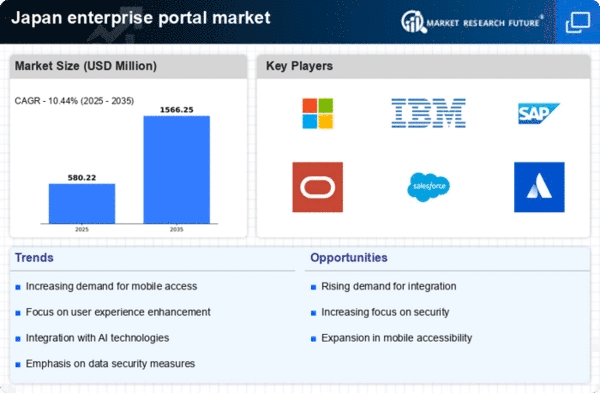Growing Importance of Data Analytics
In the context of the enterprise portal market in Japan, the increasing importance of data analytics is a key driver. Organizations are increasingly leveraging data to make informed decisions and enhance operational performance. The integration of advanced analytics tools within enterprise portals allows businesses to gain insights into user behavior, operational efficiency, and market trends. Recent reports suggest that approximately 65% of Japanese enterprises are prioritizing data-driven strategies, which is likely to boost the demand for enterprise portals equipped with analytics capabilities. This trend indicates a shift towards more intelligent and responsive enterprise portal solutions, positioning the market industry for growth as companies seek to harness the power of data.
Increased Focus on Remote Work Solutions
The enterprise portal market in Japan is significantly influenced by the rising emphasis on remote work solutions. As organizations adapt to flexible work arrangements, the need for robust enterprise portals that support remote collaboration has become paramount. Recent statistics indicate that around 60% of Japanese firms have implemented remote work policies, which necessitate the use of effective digital platforms. These portals enable employees to access critical information and collaborate efficiently, regardless of their physical location. Consequently, the enterprise portal market industry is likely to see substantial growth as companies invest in technologies that enhance remote work capabilities, ensuring productivity and connectivity in a distributed work environment.
Rising Demand for Digital Transformation
The enterprise portal market in Japan is experiencing a notable surge in demand driven by the ongoing digital transformation initiatives across various sectors. Organizations are increasingly recognizing the necessity of integrating digital solutions to enhance operational efficiency and improve customer engagement. According to recent data, approximately 70% of Japanese companies are investing in digital technologies, which is expected to propel the enterprise portal market forward. This shift towards digitalization is not merely a trend but a strategic imperative, as businesses seek to streamline processes and foster innovation. The enterprise portal market industry is thus positioned to benefit from this growing inclination towards adopting comprehensive digital frameworks that facilitate seamless communication and collaboration within organizations.
Regulatory Compliance and Governance Needs
The enterprise portal market in Japan is significantly shaped by the increasing regulatory compliance and governance needs. As businesses navigate a complex landscape of regulations, the demand for enterprise portals that facilitate compliance management is growing. Organizations are required to adhere to various legal and industry standards, which necessitates the implementation of robust governance frameworks. Recent data indicates that approximately 75% of Japanese companies are prioritizing compliance in their operational strategies. This focus on regulatory adherence is likely to drive the enterprise portal market industry, as companies seek solutions that not only streamline operations but also ensure compliance with relevant laws and regulations.
Emphasis on Customization and Personalization
The enterprise portal market in Japan is witnessing a growing emphasis on customization and personalization. As organizations strive to meet the unique needs of their users, the demand for tailored enterprise portal solutions is on the rise. Companies are increasingly seeking platforms that allow for personalized user experiences, which can enhance engagement and productivity. Recent surveys indicate that over 55% of Japanese businesses consider customization a critical factor when selecting enterprise portal solutions. This trend suggests that the enterprise portal market industry must adapt to provide flexible and customizable options that cater to diverse organizational requirements, thereby fostering user satisfaction and loyalty.
















